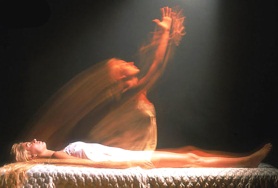
The Jiva or the individual soul along with Pranas, the mind and the senses leaves his former body and obtains a new body. He takes with himself Avidya, virtues and vicious actions and the impressions left by his previous births.
Just as a caterpillar takes hold of another object before it leaves its hold of an object, so also the soul has the vision of the body to come, before it leaves the present body. Hence the view of the Sankhyas that the self and the organs are both all-pervading and when obtaining a new body only begin to function in it on account of Karma; the view of the Bauddhas that the soul alone without the organs begins to function in a new body, new senses being formed like the new body; the view of the Vaiseshikas that the mind alone goes to the new body and the view of the Digambara Jains that the soul only flies away from the old body and alights on the new one just as a parrot flies from one tree to another, are not correct and are opposed to the Vedas. The soul goes from the body accompanied by the mind, Prana, the senses and the Sukshmabhutas or elements.
The soul takes with it the subtle parts of the elements which are the seeds of the new body. All the elements accompany the soul.
When he departs, the chief Prana departs after him and when the Prana thus departs, all the other Pranas depart after it. They cannot stay without the basis or substratum or support of the elements. The subtle elements or Tanmatras form the base for the moving Pranas.
There can be enjoyment only when the Prana goes to another body. The essence of the elements is the vehicle of the Pranas. Where the elements are, there the organs and Pranas are. They are never separated. The soul could not enter into the new body without Prana.
The Pranas and the senses remain at the time of death quite inoperative for accompanying the departing soul.
The materials like milk, curd, etc., that are offered as oblations in sacrifices assume a subtle form called Apurva and attach themselves to the sacrificer. The Jivas then go enveloped by water which is supplied by the materials that are offered as oblations in sacrifices.
The water forming the oblation assumes the subtle form of Apurva, envelopes the souls and leads them to Heaven to receive their rewards.
Those who perform sacrifices give enjoyment to the gods in heaven and rejoice with them. They become serviceable companions to the gods. They contribute to the enjoyment of the gods by their presence and service in that world. They enjoy themselves in the Chandraloka and return to the earth at the end of their store of merit.
The souls that descend from heaven have a remnant of Karma which determines their birth. The souls return to the earth by the force of some unenjoyed remnants of Karma. When the totality of works which helped the souls to go to the Chandraloka for enjoyment of the fruits of good deeds is exhausted, then the body made up of water which has originated there for the sake of enjoyment is dissolved by the fire of sorrow springing from the thought that the enjoyment comes to an end, just as hailstones melt by contact with the rays of the sun, just as ghee melts by contact with fire. Then the souls come down with a remainder yet left.
We read in the Chhandogya Upanishad V. 107: “Those whose conduct during the previous life has been good presently obtain good birth, such as the birth of a Brahmin, a Kshatriya, or a Vaisya; those whose conduct has been bad presently obtain some evil birth such as that of a dog or a pig.”
The Smriti says: “The members of the different castes and of the different orders of life who are engaged in the works prescribed for them, after leaving this world and enjoying the fruits of their works in other world, are born again owing to the unenjoyed portion of their rewards, in distinguished castes and families, with special beauty, longevity, knowledge, conduct, property, comfort and
10.09.15
intelligence.” Hence the soul is born with residual Karma.
Some capital sins like the killing of a Brahmin involve many births. The soul descends by the route by which he went to a certain stage and then by a different route.
The sinners do not go to Chandraloka. They go to Yama Loka or the world of punishment and after having experienced the results of their evil deeds come down to the earth.
Hells are places of torture for the evil-doers. The temporary abodes are Raurava, Maharaurava, Vahni, Vaitarani and Kumbhika. The two eternal hells are Tamisra (darkness) and Andhatamisra (blinding darkness). The seven hells are superintended by Chitragupta and others. Yama is the chief ruler in those seven hells also. Chitragupta and others are only superintendents and lieutenants employed by Yama.